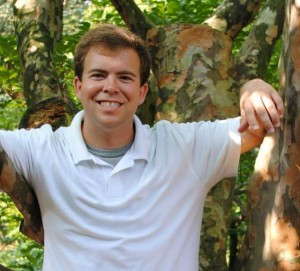Scholarship Supports Ph.D. Graduate’s Research
 Recent Ph.D. graduate Jared Barnes has always had a passion for learning about horticulture — a passion he hopes to now pass on to a new generation of future horticulture students as he begins his career.
Recent Ph.D. graduate Jared Barnes has always had a passion for learning about horticulture — a passion he hopes to now pass on to a new generation of future horticulture students as he begins his career.
Barnes recently graduated with a Ph.D. in horticultural science from North Carolina State University (NC State). He was the 2013 recipient of the Richard T. Meister Scholarship, which was offered for the first time last year to support graduate floriculture research at land-grant universities.
Barnes was also this year’s recipient of the John Carew Memorial Scholarship, which is open to graduate students in horticulture with an interest in greenhouse crops.
Barnes says the scholarships he has been awarded through the American Floral Endowment (AFE) have impacted him tremendously.
“It’s an honor,” Barnes says. “I’m thankful AFE supports students in this way. It helps to lessen the financial burden on students.”
The scholarships have allowed Barnes to further his education by attending conferences, purchasing books, becoming a member of horticultural organizations and traveling abroad, he says.
During his Ph.D. candidacy, Barnes’ main project focused on quantifying the factors that influence soilless substrate pH.
“Substrate pH is an important factor for growers to manage because it influences nutrient availability, and if the pH drifts out of the optimum growing range, poor crop quality and crop loss can result,” he says.
Barnes focused specifically on the effect of fertilizers. With the help of Dave Dickey at NC State, Barnes was able to devise a method of evaluating the effects of fertilizer-related factors, while cultivating Salvia farinacea ‘Evolution White.’ His research showed that nitrogen form had the greatest effect on substrate pH, and that phosphorus and potassium had
minor effects.
“The answers from our work will hopefully one day give researchers the ability to build a model that would allow growers to calculate how substrate pH would change over time in a crop,” he says.
Curious From The Start
Barnes’ first experiences with horticulture date back to his childhood, when he would work with his great-grandfather in his garden. When he was 12 years old, Barnes’ great-grandfather passed away, leading Barnes to seek out more information about gardening on his own.
When he was 15, he signed up for a local master gardener class, giving him his first exposure to floriculture. And as Barnes began reading and listening to speakers to learn more about gardening, he eventually realized that he had a desire to follow in the footsteps of those from whom he had learned so much.
In his late teens, Barnes started sharing his experiences in the form of a newsletter that he sent out to the local community. Eventually, the editor of a local magazine based in west Tennessee picked up on the newsletter, and asked Barnes to start writing a column.
“When I came to North Carolina, other people found out (about my writing), and from there it just snowballed,” says Barnes.
He now gives garden talks and writes about horticulture for various publications.
As an undergraduate, Barnes attended the University of Tennessee at Martin and obtained a degree in environmental biology. His ultimate goal was to teach plant sciences, which led him to pursue advanced degrees in his field.
He obtained his master’s degree in horticulture science from North Carolina State University, where he studied nutritional disorders in floriculture crops.
Barnes knew that if he did want to teach and have a career in horticulture, he had to take a cue from other individuals on the cutting edge of the industry.
“Other people had Ph.Ds. These were the people on the front lines. They were doing it right,” Barnes says.
Encouraging Others To Get Involved
Barnes hopes to use his own expertise to cultivate a new generation of gardeners.
“I hope to continue teaching, educating others about horticulture, whether in the classroom or out in the community,” he says.
Barnes says he knows that horticulture is fun and believes it is one of the best hobbies out there, but he says one of the challenges of the industry is helping other people to see it that way too. He says people in the industry need to be asking the question, “Why is Generation Y seemingly disconnected from plants?”
Barnes wants to teach young generations that plants can be a positive influence on one’s life. He never set out to advance his career by writing articles and giving talks, but rather, he intended simply to share his experiences with other people interested in gardening.
“It’s fun. I like to tell people what’s going on in my garden,” Barnes says. “It’s good to be out there on the front lines with people.”
Barnes encourages future horticulture students to have that same type of curiosity. He believes that the way to recruit students to the industry is to instill in them a passion for gardening, and proposes giving talks and workshops in schools as one way to make plants fun for young students.
“We are all in this together. We have to do something,” Barnes says. “If we instill the passion of horticulture in our youth, I think they will be lifelong gardeners.”
For those already pursuing studies in horticulture, Barnes advises them to take initiative.
“That’s one of the most under-appreciated things. Do something before someone asks for it. Write articles. Work in garden centers. Don’t wait for someone to tell you to do something. Be out there searching for opportunities,” he says.
Most importantly, Barnes advises students to keep learning.
“I think it’s always important for us to continue to advance ourselves, to keep growing,” says Barnes.
To learn more about Barnes, visit his website, HarvestAndSnow.com.
About The Scholarship
Applications are now being accepted for the Richard T. Meister Scholarship, which will be offered in 2014 to graduate students in floriculture intending to pursue their careers in the land-grant university system with interest in research, Extension or teaching. The scholarship is dedicated to the outstanding accomplishments of those in university Extension.
The $2,500 scholarship is awarded annually and administered by the American Floral Endowment (AFE). Students can apply online.
Dick Meister built upon his family’s business in publishing magazines for specialized agriculture. He is a strong supporter of the land-grant college system and through the years worked closely with many industry leaders. Meister is the editor-at-large and chairman emeritus of Meister Media Worldwide, Greenhouse Grower’s parent company.









